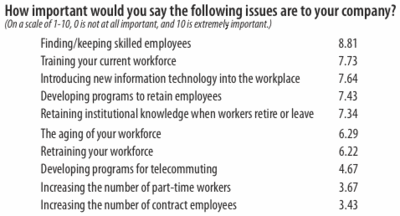 The 75 million baby boomers will start retiring in large numbers by the end of the decade, with the first boomers hitting age 62 in 2008.
The 75 million baby boomers will start retiring in large numbers by the end of the decade, with the first boomers hitting age 62 in 2008.
The 75 million baby boomers will start retiring in large numbers by the end of the decade, with the first boomers hitting age 62 in 2008. With boomers making up one-third of the U.S. workforce, labor shortages (example: half of the federal civilian workforce will be eligible to retire within four years) will force many businesses to rethink training, retention, retirement and recruitment.
This month’s survey, conducted by Conkling Fiskum & McCormick, shows that while the 718 respondents realize this, they haven’t taken steps to prepare. “We find in survey after survey, although employers are cognizant of the aging workforce, they still have not done much to retain and attract older workers. Why? For the most part, the need hasn’t hit them yet,” says Sara Rix, a senior policy adviser for AARP. The survey also shows little emphasis on training, something Rix says is dangerous. “Training doesn’t last a lifetime anymore. It’s up to employers to give their workers the skills,” she says, adding that the key thing employers need to keep in mind is they will need skilled labor. “Not all jobs can be shipped offshore.”
Rix advises employers to do an age audit of their workers, asking who is likely to be retiring, what would encourage them to work longer, and who might be interested in a phased retirement. Rix says that many older workers say they would delay retirement if there were phased-retirement options, or part-time jobs. Almost 80% of boomer-age workers say they expect to work in retirement. “We’re hoping many workplaces will have the program and policies in place to retain them,” Rix says.
To participate in the Input survey, send an e-mail to [email protected].
Research conducted by Conkling Fiskum & McCormick.


